formerly eScholarship Editions


|
|
|
|
Your request for similar items found 20 book(s). | Modify Search | Displaying 1 - 20 of 20 book(s) | |
| 1. | 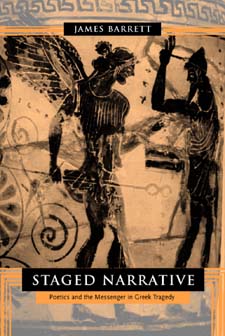 | Title: Staged narrative: poetics and the messenger in Greek tragedy Author: Barrett, James 1953- Published: University of California Press, 2002 Subjects: Classics | Classical Literature and Language Publisher's Description: The messenger who reports important action that has occurred offstage is a familiar inhabitant of Greek tragedy. A messenger informs us about the death of Jocasta and the blinding of Oedipus, the madness of Heracles, the slaughter of Aigisthos, and the death of Hippolytus, among other important events. Despite its prevalence, this conventional figure remains only little understood. Combining several critical approaches - narrative theory, genre study, and rhetorical analysis - this lucid study develops a synthetic view of the messenger of Greek tragedy, showing how this role illuminates some of the genre's most persistent concerns, especially those relating to language, knowledge, and the workings of tragic theater itself. James Barrett gives close readings of several plays including Aeschylus's Persians, Sophocles' Electra and Oedipus Tyrannus, and Euripides' Bacchae and Rhesos. He traces the literary ancestry of the tragic messenger, showing that the messenger's narrative constitutes an unexplored site of engagement with Homeric epic, and that the role illuminates fifth-century b.c. experimentation with modes of speech. Breaking new ground in the study of Athenian tragedy, Barrett deepens our understanding of many central texts and of a form of theater that highlights the fragility and limits of human knowledge, a theme explored by its use of the messenger. [brief] Similar Items |
| 2. | 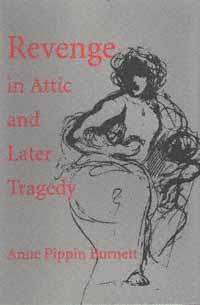 | Title: Revenge in Attic and later tragedy Author: Burnett, Anne Pippin 1925- Published: University of California Press, 1998 Subjects: Classics | Classical Literature and Language | Literature in Translation Publisher's Description: Modern readings of ancient Athenian drama tend to view it as a presentation of social or moral problems, as if ancient drama showed the same realism seen on the present-day stage. Such views are belied by the plays themselves, in which supremely violent actions occur in a legendary time and place distinct both from reality and from the ethics of ordinary life. Offering fresh readings of Attic tragedy, Anne Pippin Burnett urges readers to peel away twentieth-century attitudes toward vengeance and reconsider the revenge tragedies of ancient Athens in their own context.After a consideration of how our view of Elizabethan drama has obscured an accurate view of the ancient tragedies, Burnett reviews early Greek notions of vengeance as expressed in the Odyssey , Heracles' tales, Pindar's odes, Attic judicial processes, and the legend of Harmodius and Aristogeiton. Then, setting aside post-Platonic and Judeo-Christian notions of criminality, she provides new interpretations of all the Attic tragedies in which revenge is a central theme: Aeschylus' Libation Bearers , Sophocles' Ajax, Electra, and Tereus , and Euripides' Children of Heracles, Hecuba, Medea, Electra, and Orestes. Burnett shows that for the ancients, revenge meant a redress of imbalances in both human and divine worlds, achieved through human actions. The vengeful heroines thus appear in a new light. Electra, Hecuba, Medea, and others cease to be the picture of depravity in dramas that are grotesque and sensational, and are instead representative human figures who respond with grandeur to the outsize demands of necessity and supernatural powers. [brief] Similar Items |
| 3. | 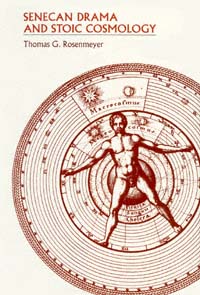 | Title: Senecan drama and stoic cosmology Author: Rosenmeyer, Thomas G Published: University of California Press, 1989 Subjects: Classics | Classical Literature and Language | Classical Philosophy | Theatre Publisher's Description: Lucius Annaeus Seneca, Nero's tutor and advisor, wrote philosophical essays, some of them in the form of letters, and dramas on Greek mythological topics, which since the early Renaissance have exercised a powerful influence on the European theater. Because in his essays Seneca, in his own eclectic way, subscribes to the philosophy of the Stoic school, scholars and critics have long been asking the question whether the plays, also, could be regarded as transmitters of Stoic thought. Various answers, ranging from a categorical no to an uneasy yes, have been given.With few exceptions, the students who have concerned themselves with this question have looked for their enlightenment in Stoic psychology and Stoic ethics. In this book, Thomas G. Rosenmeyer proposes instead to look at the Stoic science of nature, of the world and human beings in the world, as a more plausible grounding for the difference between Senecan drama and its Greek predecessors. In the process of looking at what the Stoics, especially the early Stoics, had to say about the forces determining natural phenomena, the author uncovers a deeply pessimistic strain in Stoic cosmology, and an interest in physicality and environmental tension, that he finds replicated in the theater, not only of Seneca, but also of the later European tradition indebted to him. [brief] Similar Items |
| 4. | 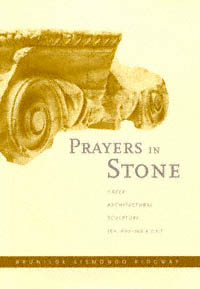 | Title: Prayers in stone: Greek architectural sculpture ca. 600-100 B.C.E Author: Ridgway, Brunilde Sismondo 1929- Published: University of California Press, 1999 Subjects: Classics | Art | Art and Architecture | Art History Publisher's Description: The meaning of architectural sculpture is essential to our understanding of ancient Greek culture. The embellishment of buildings was common for the ancient Greeks, and often provocative. Some ornamental sculpture was placed where, when the building was finished, no mortal eye could view it. And unlike much architectural ornamentation of other cultures, Greek sculpture was often integral to the building, not just as decoration, and could not be removed without affecting the integrity of the building structure. This book is the first comprehensive treatment of the significance of Greek architectural sculpture. Brunilde Sismondo Ridgway, a world-class authority on ancient Greek sculpture, provides a highly informative tour of many dimensions of Greek public buildings - especially temples, tombs, and treasuries - in a text that is at once lucid, accessible, and authoritative.Ridgway's pragmatism and common sense steer us tactfully and clearly through thickets of uncertainty and scholarly disagreement. She refers to a huge number of monuments, and documents her discussions with copious and up-to-date bibliographies. This book is sure to be acknowledged at once as the standard treatment of its important topic. [brief] Similar Items |
| 5. | 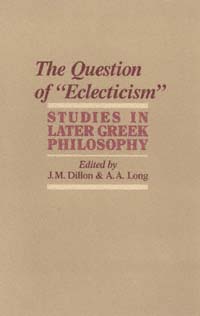 | Title: The Question of "eclecticism": studies in later Greek philosophy Author: Dillon, John M Published: University of California Press, 1988 Subjects: Classics | Classical Philosophy | Social and Political Thought Publisher's Description: This collection of essays is addressed to the growing number of philosophers, classicists, and intellectual historians who are interested in the development of Greek thought after Aristotle. In nine original studies, the authors explore the meaning and history of "eclecticism" in the context of ancient philosophy. The book casts fresh light on the methodology of such central figures as Cicero, Philo, Plutarch, Sextus Empiricus, and Ptolemy, and also illuminates many of the conceptual issues discussed most creatively in this period. [brief] Similar Items |
| 6. | 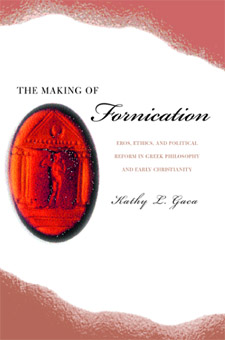 | Title: The making of fornication: eros, ethics, and political reform in Greek philosophy and early Christianity Author: Gaca, Kathy L Published: University of California Press, 2003 Subjects: Classics | Classical Philosophy | Classical Religions | Classical Politics | Christianity | Ethics | Social and Political Thought | Ancient History | Intellectual History Publisher's Description: This provocative work provides a radical reassessment of the emergence and nature of Christian sexual morality, the dominant moral paradigm in Western society since late antiquity. While many scholars, including Michel Foucault, have found the basis of early Christian sexual restrictions in Greek ethics and political philosophy, Kathy L. Gaca demonstrates on compelling new grounds that it is misguided to regard Greek ethics and political theory - with their proposed reforms of eroticism, the family, and civic order - as the foundation of Christian sexual austerity. Rather, in this thoroughly informed and wide-ranging study, Gaca shows that early Christian goals to eradicate fornication were derived from the sexual rules and poetic norms of the Septuagint, or Greek Bible, and that early Christian writers adapted these rules and norms in ways that reveal fascinating insights into the distinctive and largely non-philosophical character of Christian sexual morality. Writing with an authoritative command of both Greek philosophy and early Christian writings, Gaca investigates Plato, the Stoics, the Pythagoreans, Philo of Alexandria, the apostle Paul, and the patristic Christians Clement of Alexandria, Tatian, and Epiphanes, freshly elucidating their ideas on sexual reform with precision, depth, and originality. Early Christian writers, she demonstrates, transformed all that they borrowed from Greek ethics and political philosophy to launch innovative programs against fornication that were inimical to Greek cultural mores, popular and philosophical alike. The Septuagint's mandate to worship the Lord alone among all gods led to a Christian program to revolutionize Gentile sexual practices, only for early Christians to find this virtually impossible to carry out without going to extremes of sexual renunciation. Knowledgeable and wide-ranging, this work of intellectual history and ethics cogently demonstrates why early Christian sexual restrictions took such repressive ascetic forms, and casts sobering light on what Christian sexual morality has meant for religious pluralism in Western culture, especially among women as its bearers. [brief] Similar Items |
| 7. | 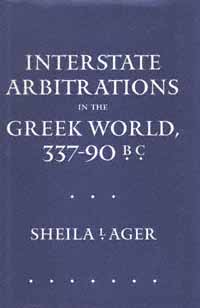 | Title: Interstate arbitrations in the Greek world, 337-90 B.C. Author: Ager, Sheila L 1956- Published: University of California Press, 1997 Subjects: Classics | Classical History | Ancient History Publisher's Description: A great deal of information has come to light over the past several decades about the role of arbitration between the Greek states. Arbitration and mediation were, in fact, central institutions in Hellenistic public life. In this comprehensive study, Sheila Ager brings together the scattered body of literary and epigraphical sources on arbitration, together with up-to-date bibliographic references, and commentary.The sources collected here range widely; Ager presents an exhaustive record of documents ranging from the settlement of a minor territorial squabble between two tiny city-states to the resolution of major conflicts separating the great powers of the day. In addition, Ager's introduction sets the documents in historical context and outlines distinctions among categories of arbitration. The work also includes indices to literary passages, inscriptions, persons, places, subjects, and Greek and Latin terms in the documents. This collection of many previously inaccessible texts will become a primary resource for any scholar or student working in the field of Hellenistic history. [brief] Similar Items |
| 8. | 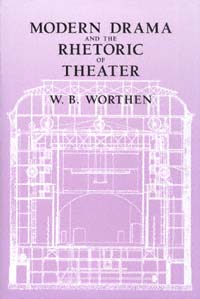 | Title: Modern drama and the rhetoric of theater Author: Worthen, William B 1955- Published: University of California Press, 1991 Subjects: Cinema and Performance Arts | Theatre | Rhetoric Publisher's Description: The history of drama is typically viewed as a series of inert "styles." Tracing British and American stage drama from the 1880s onward, W. B. Worthen instead sees drama as the interplay of text, stage production, and audience.How are audiences manipulated? What makes drama meaningful? Worthen identifies three rhetorical strategies that distinguish an O'Neill play from a Yeats, or these two from a Brecht. Where realistic theater relies on the "natural" qualities of the stage scene, poetic theater uses the poet's word, the text, to control performance. Modern political theater, by contrast, openly places the audience at the center of its rhetorical designs, and the drama of the postwar period is shown to develop a range of post-Brechtian practices that make the audience the subject of the play.Worthen's book deserves the attention of any literary critic or serious theatergoer interested in the relationship between modern drama and the spectator. [brief] Similar Items |
| 9. | 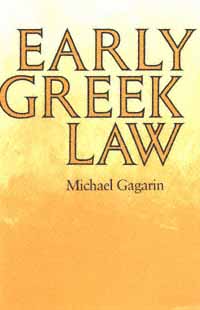 | Title: Early Greek law Author: Gagarin, Michael Published: University of California Press, 1989 Subjects: Classics | Classical Politics | Law Publisher's Description: Drawing on the evidence of anthropology as well as ancient literature and inscriptions, Gagarin examines the emergence of law in Greece from the 8th through the 6th centuries B.C., that is, from the oral culture of Homer and Hesiod to the written enactment of codes of law in most major cities. Similar Items |
| 10. | 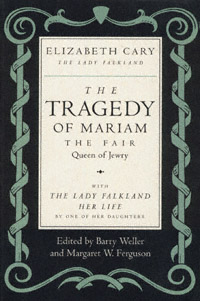 | Title: The tragedy of Mariam, the fair queen of Jewry Author: Cary, Elizabeth, Lady 1585 or 6-1639 Published: University of California Press, 1994 Subjects: Literature | Renaissance Literature | English Literature | Literary Theory and Criticism | Women's Studies | Autobiographies and Biographies Publisher's Description: The Tragedy of Mariam (1613) is the first original play by a woman to be published in England, and its author is the first English woman writer to be memorialized in a biography, which is included with this edition of the play. Mariam is a distinctive example of Renaissance drama that serves the desire of today's readers and scholars to know not merely how women were represented in the early modern period but also how they themselves perceived their own condition.With this textually emended and fully annotated edition, the play will now be accessible to all readers. The accompanying biography of Cary further enriches our knowledge of both domestic and religious conflicts in the seventeenth century. [brief] Similar Items |
| 11. | 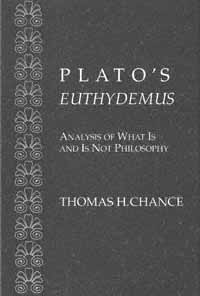 | Title: Plato's Euthydemus: analysis of what is and is not philosophy Author: Chance, Thomas H Published: University of California Press, 1992 Subjects: Philosophy | Social and Political Thought | Classical Philosophy | Literature Publisher's Description: With Plato's Euthydemus , Thomas Chance solves a longstanding riddle of Platonic studies. Thought to be an early, immature work, the Euthydemus has come across to scholars as lacking Plato's characteristic greatness. This apparent lack, Chance argues, is not a failure of the text but of scholarly perception. He advances a single thesis: that Plato deliberately presents eristic - contentious debate - as the antithesis to his own philosophical method. Once this thesis is accepted, the "hidden" purpose of the Euthydemus becomes manifest: Plato has used the occasion of his dialogue to combine a brilliantly crafted parody of sophistic antilogy with a subtle yet forceful exhortation designed to persuade all of us to pursue virtue and to love wisdom. [brief] Similar Items |
| 12. | 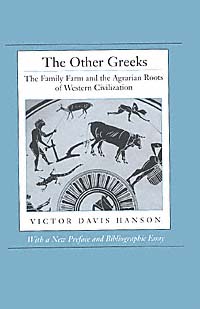 | Title: The other Greeks: the family farm and the agrarian roots of western civilization Author: Hanson, Victor Davis Published: University of California Press, 1999 Subjects: Classics | European History Publisher's Description: For generations, scholars have focused on the rise of the Greek city-state and its brilliant cosmopolitan culture as the ultimate source of the Western tradition in literature, philosophy, and politics. This passionate book leads us outside the city walls to the countryside, where the vast majority of the Greek citizenry lived, to find the true source of the cultural wealth of Greek civilization. Victor Hanson shows that the real "Greek revolution" was not merely the rise of a free and democratic urban culture, but rather the historic innovation of the independent family farm.The farmers, vinegrowers, and herdsmen of ancient Greece are "the other Greeks," who formed the backbone of Hellenic civilization. It was these tough-minded, practical, and fiercely independent agrarians, Hanson contends, who gave Greek culture its distinctive emphasis on private property, constitutional government, contractual agreements, infantry warfare, and individual rights. Hanson's reconstruction of ancient Greek farm life, informed by hands-on knowledge of the subject (he is a fifth-generation California vine- and fruit-grower) is fresh, comprehensive, and absorbing. His detailed chronicle of the rise and tragic fall of the Greek city-state also helps us to grasp the implications of what may be the single most significant trend in American life today - the imminent extinction of the family farm. [brief] Similar Items |
| 13. | 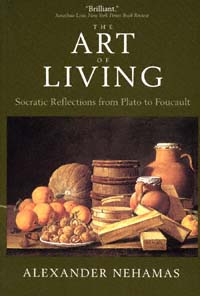 | Title: The art of living: Socratic reflections from Plato to Foucault Author: Nehamas, Alexander 1946- Published: University of California Press, 1998 Subjects: Classics | Classical Philosophy | Classical Literature and Language | Philosophy | Social and Political Thought | Literature Publisher's Description: For much of its history, philosophy was not merely a theoretical discipline but a way of life, an "art of living." This practical aspect of philosophy has been much less dominant in modernity than it was in ancient Greece and Rome, when philosophers of all stripes kept returning to Socrates as a model for living. The idea of philosophy as an art of living has survived in the works of such major modern authors as Montaigne, Nietzsche, and Foucault. Each of these writers has used philosophical discussion as a means of establishing what a person is and how a worthwhile life is to be lived. In this wide-ranging, brilliantly written account, Alexander Nehamas provides an incisive reevaluation of Socrates' place in the Western philosophical tradition and shows the importance of Socrates for Montaigne, Nietzsche, and Foucault.Why does each of these philosophers - each fundamentally concerned with his own originality - return to Socrates as a model? The answer lies in the irony that characterizes the Socrates we know from the Platonic dialogues. Socratic irony creates a mask that prevents a view of what lies behind. How Socrates led the life he did, what enabled or inspired him, is never made evident. No tenets are proposed. Socrates remains a silent and ambiguous character, forcing readers to come to their own conclusions about the art of life. This, Nehamas shows, is what allowed Montaigne, Nietzsche, and Foucault to return to Socrates as a model without thereby compelling them to imitate him.This highly readable, erudite study argues for the importance of the tradition within Western philosophy that is best described as "the art of living" and casts Montaigne, Nietzsche, and Foucault as the three major modern representatives of this tradition. Full of original ideas and challenging associations, this work will offer new ways of thinking about the philosophers Nehamas discusses and about the discipline of philosophy itself. [brief] Similar Items |
| 14. | 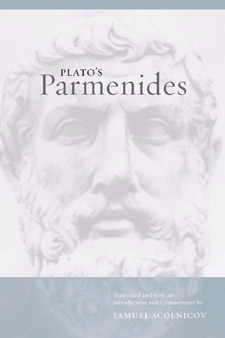 | Title: Plato's Parmenides Author: Plato Published: University of California Press, 2003 Subjects: Classics | Philosophy | Classical Philosophy Publisher's Description: Of all Plato's dialogues, the Parmenides is notoriously the most difficult to interpret. Scholars of all periods have disagreed about its aims and subject matter. The interpretations have ranged from reading the dialogue as an introduction to the whole of Platonic metaphysics to seeing it as a collection of sophisticated tricks, or even as an elaborate joke. This work presents an illuminating new translation of the dialogue together with an extensive introduction and running commentary, giving a unified explanation of the Parmenides and integrating it firmly within the context of Plato's metaphysics and methodology. Scolnicov shows that in the Parmenides Plato addresses the most serious challenge to his own philosophy: the monism of Parmenides and the Eleatics. In addition to providing a serious rebuttal to Parmenides, Plato here re-formulates his own theory of forms and participation, arguments that are central to the whole of Platonic thought, and provides these concepts with a rigorous logical and philosophical foundation. In Scolnicov's analysis, the Parmenides emerges as an extension of ideas from Plato's middle dialogues and as an opening to the later dialogues. Scolnicov's analysis is crisp and lucid, offering a persuasive approach to a complicated dialogue. This translation follows the Greek closely, and the commentary affords the Greekless reader a clear understanding of how Scolnicov's interpretation emerges from the text. This volume will provide a valuable introduction and framework for understanding a dialogue that continues to generate lively discussion today. [brief] Similar Items |
| 15. | 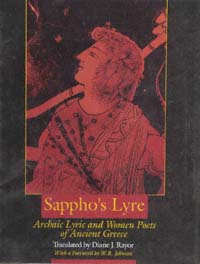 | Title: Sappho's lyre: archaic lyric and women poets of ancient Greece Author: Rayor, Diane J Published: University of California Press, 1991 Subjects: Classics | Classical Literature and Language | Literature in Translation | Poetry Publisher's Description: Sappho sang her poetry to the accompaniment of the lyre on the Greek island of Lesbos over 2500 years ago. Throughout the Greek world, her contemporaries composed lyric poetry full of passion, and in the centuries that followed the golden age of archaic lyric, new forms of poetry emerged. In this unique anthology, today's reader can enjoy the works of seventeen poets, including a selection of archaic lyric and the complete surviving works of the ancient Greek women poets - the latter appearing together in one volume for the first time. Sappho's Lyre is a combination of diligent research and poetic artistry. The translations are based on the most recent discoveries of papyri (including "new" Archilochos and Stesichoros) and the latest editions and scholarship. The introduction and notes provide historical and literary contexts that make this ancient poetry more accessible to modern readers.Although this book is primarily aimed at the reader who does not know Greek, it would be a splendid supplement to a Greek language course. It will also have wide appeal for readers of' ancient literature, women's studies, mythology, and lovers of poetry. [brief] Similar Items |
| 16. | 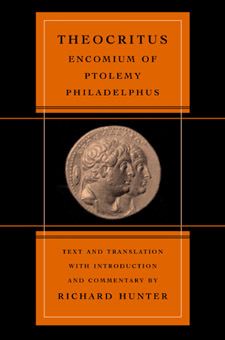 | Title: Encomium of Ptolemy Philadelphus Author: Theocritus Published: University of California Press, 2003 Subjects: Classics | Classical Literature and Language | Poetry Publisher's Description: Under Ptolemy II Philadelphus, who ruled Egypt in the middle of the third century B.C.E., Alexandria became the brilliant multicultural capital of the Greek world. Theocritus's poem in praise of Philadelphus - at once a Greek king and an Egyptian pharaoh - is the only extended poetic tribute to this extraordinary ruler that survives. Combining the Greek text, an English translation, a full line-by-line commentary, and extensive introductory studies of the poem's historical and literary context, this volume also offers a wide-ranging and far-reaching consideration of the workings and representation of poetic patronage in the Ptolemaic age. In particular, the book explores the subtle and complex links among Theocritus's poem, modes of praise drawn from both Greek and Egyptian traditions, and the subsequent flowering of Latin poetry in the Augustan age. As the first detailed account of this important poem to show how Theocritus might have drawn on the pharaonic traditions of Egypt as well as earlier Greek poetry, this book affords unique insight into how praise poetry for Ptolemy and his wife may have helped to negotiate the adaptation of Greek culture that changed conditions of the new Hellenistic world. Invaluable for its clear translation and its commentary on genre, dialect, diction, and historical reference in relation to Theocritus's Encomium, the book is also significant for what it reveals about the poem's cultural and social contexts and about Theocritus' devices for addressing his several readerships. COVER IMAGE: The image on the front cover of this book is incorrectly identified on the jacket flap. The correct caption is: Gold Oktadrachm depicting Ptolemy II and Arsinoe (mid-third century BCE; by permission of the Museum of Fine Arts, Boston). [brief] Similar Items |
| 17. | 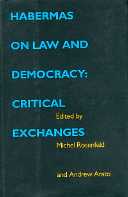 | Title: Habermas on law and democracy: critical exchanges Author: Rosenfeld, Michel 1948- Published: University of California Press, 1998 Subjects: Philosophy | Law | Politics Publisher's Description: In the first essay, Habermas himself succinctly presents the centerpiece of his theory: his proceduralist paradigm of law. The following essays comprise elaborations, criticisms, and further explorations by others of the most salient issues addressed in his theory. The distinguished group of contributors - internationally prominent scholars in the fields of law, philosophy, and social theory - includes many who have been closely identified with Habermas as well as some of his best-known critics. The final essay is a thorough and lengthy reply by Habermas, which not only engages the most important arguments raised in the preceding essays but also further elaborates and refines some of his own key contributions in Between Facts and Norms . This volume will be essential reading for philosophers, legal scholars, and political and social theorists concerned with understanding the work of one of the leading philosophers of our age.These provocative, in-depth debates between Jürgen Habermas and a wide range of his critics relate to the philosopher's contribution to legal and democratic theory in his recently published Between Facts and Norms . Drawing upon his discourse theory, Habermas has elaborated a novel and powerful account of law that purports to bridge the gap between democracy and rights, by conceiving law to be at once self-imposed and binding. [brief] Similar Items |
| 18. | 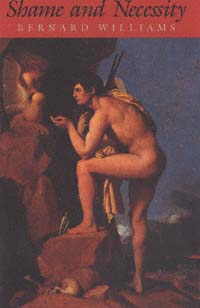 | Title: Shame and necessity Author: Williams, Bernard Arthur Owen Published: University of California Press, 1993 Subjects: Philosophy | Ethics | Classics | Classical Philosophy | Literary Theory and Criticism Publisher's Description: We tend to suppose that the ancient Greeks had primitive ideas of the self, of responsibility, freedom, and shame, and that now humanity has advanced from these to a more refined moral consciousness. Bernard Williams's original and radical book questions this picture of Western history. While we are in many ways different from the Greeks, Williams claims that the differences are not to be traced to a shift in these basic conceptions of ethical life. We are more like the ancients than we are prepared to acknowledge, and only when this is understood can we properly grasp our most important differences from them, such as our rejection of slavery.The author is a philosopher, but much of his book is directed to writers such as Homer and the tragedians, whom he discusses as poets and not just as materials for philosophy. At the center of his study is the question of how we can understand Greek tragedy at all, when its world is so far from ours.Williams explains how it is that when the ancients speak, they do not merely tell us about themselves, but about ourselves. Shame and Necessity gives a new account of our relations to the Greeks, and helps us to see what ethical ideas we need in order to live in the modern world. [brief] Similar Items |
| 19. | 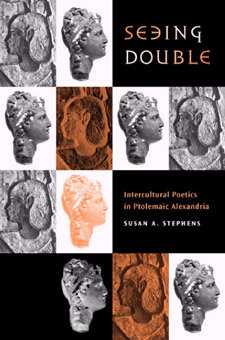 | Title: Seeing double: intercultural poetics in Ptolemaic Alexandria Author: Stephens, Susan A Published: University of California Press, 2003 Subjects: Classics | Classical Literature and Language | Poetry | Classical Politics Publisher's Description: When, in the third century B.C.E., the Ptolemies became rulers in Egypt, they found themselves not only kings of a Greek population but also pharaohs for the Egyptian people. Offering a new and expanded understanding of Alexandrian poetry, Susan Stephens argues that poets such as Callimachus, Theocritus, and Apollonius proved instrumental in bridging the distance between the two distinct and at times diametrically opposed cultures under Ptolemaic rule. Her work successfully positions Alexandrian poetry as part of the dynamic in which Greek and Egyptian worlds were bound to interact socially, politically, and imaginatively. The Alexandrian poets were image-makers for the Ptolemaic court, Seeing Double suggests; their poems were political in the broadest sense, serving neither to support nor to subvert the status quo, but to open up a space in which social and political values could be imaginatively re-created, examined, and critiqued. Seeing Double depicts Alexandrian poetry in its proper context - within the writing of foundation stories and within the imaginative redefinition of Egypt as "Two Lands" - no longer the lands of Upper and Lower Egypt, but of a shared Greek and Egyptian culture. [brief] Similar Items |
| 20. | 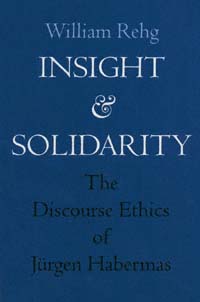 | Title: Insight and solidarity: a study in the discourse ethics of Jürgen Habermas Author: Rehg, William Published: University of California Press, 1997 Subjects: Philosophy | Law | Politics Publisher's Description: Discourse ethics represents an exciting new development in neo-Kantian moral theory. William Rehg offers an insightful introduction to its complex theorization by its major proponent, Jürgen Habermas, and demonstrates how discourse ethics allows one to overcome the principal criticisms that have been leveled against neo-Kantianism.Addressing both "commun-itarian" critics who argue that universalist conceptions of justice sever moral deliberation from community traditions, and feminist advocates of the "ethics of care" who stress the moral significance of caring for other individuals, Rehg shows that discourse ethics combines impartiality with solidarity. He provides the first systematic reconstruction of Habermas's theory and explores its relationship to the work of such contemporary philosophers as Charles Taylor. His book articulates a bold alternative to the split between the "right" and the "good" in moral theory and will greatly interest philosophers, social and legal scholars, and political theorists. [brief] Similar Items |